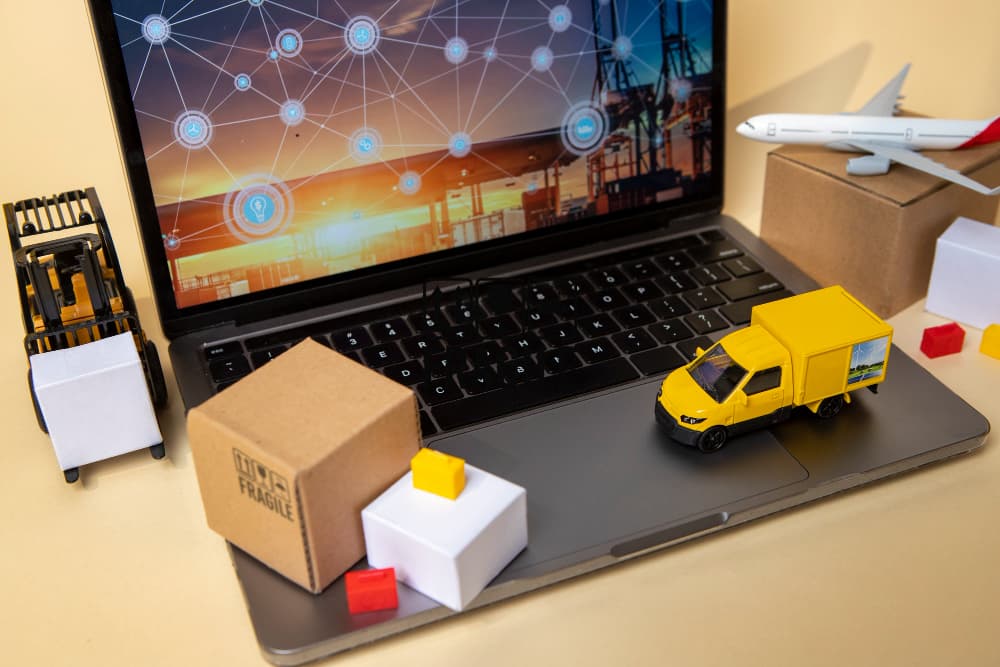Blockchain technology has been making waves across various industries, and one area where its potential is truly transformative is supply chain management. The global trade landscape has always faced challenges regarding transparency, traceability, and trust. However, with the advent of Blockchain, these issues can finally be addressed head-on.
By leveraging blockchain technology in supply chain management, businesses can build a transparent ecosystem that ensures accountability, enhances product traceability, improves efficiency, and reduces costs. In this blog post, we will explore how Blockchain is revolutionizing the way goods are sourced, manufactured, tracked, and delivered around the world.
Building a Transparent Supply Chain
Building a transparent supply chain is crucial in today’s global market. With the complexity of international trade and distribution networks, it can be challenging to track and verify the movement of goods from one point to another. However, with blockchain technology, businesses have a powerful tool to create an open and trustworthy supply chain.
Blockchain provides a decentralized ledger that records all transactions across multiple participants in real time. This means that every step of the supply chain can be documented securely and transparently, allowing stakeholders to trace the origin of products and verify their authenticity.
By implementing Blockchain into supply chain management processes, companies can ensure better quality control. Each product or component can be assigned a unique digital identifier on the Blockchain, making it easier to track its journey through each stage of production and ensuring compliance with quality standards.
Top 10 Uses of Blockchain in Supply Chain
Blockchain technology has emerged as a game-changer in supply chain management. Its decentralized and transparent nature offers numerous benefits for businesses involved in global trade. Here are the top 10 uses of Blockchain in the supply chain:
1. Transparency: Blockchain allows for real-time visibility and tracking of goods throughout the supply chain, reducing fraud and ensuring accountability.
2. Product authentication: By using unique digital identities stored on the Blockchain, companies can verify the authenticity of products and prevent counterfeiting.
3. Quality control: With Blockchain, every step of production and quality testing can be recorded securely, ensuring that only high-quality products reach consumers.
4. Finance: Blockchain-based smart contracts eliminate intermediaries, streamlining payment processes and reducing transaction costs.
5. Smart contracts: These self-executing agreements automatically enforce terms between parties without the need for intermediaries or human intervention.
6. Inventory management: Blockchain provides accurate inventory data in real time, enabling better demand forecasting and optimizing stock levels.
7. Reducing paperwork: Digitizing documents like bills of lading on the Blockchain eliminates manual paperwork, saving time and reducing errors.
8. Food safety: Blockchain enables end-to-end traceability in food supply chains, quickly identifying contamination sources during recalls or outbreaks.
9. Compliance: Companies can ensure compliance with regulations by recording all relevant information on the immutable blockchain ledger.
10. Sustainable sourcing: With Blockchain’s ability to track product origins and certifications, businesses can promote sustainable sourcing practices while building consumer trust.
Transparency
Transparency is a critical aspect of supply chain management, and blockchain technology has the potential to revolutionize how transparency is achieved. With traditional supply chains, it can be challenging to track a product’s journey from its origin to the end consumer. However, Blockchain provides an immutable and transparent ledger that records every transaction or event related to a product.
By leveraging Blockchain in supply chain management, companies can create a decentralized system where all stakeholders can access real-time information about the movement and status of goods. This increased visibility enables better decision-making, reduces the risk of fraud or counterfeiting, and enhances trust between parties involved in the supply chain.
Product authentication
Product authentication is a crucial aspect of supply chain management, ensuring that products are genuine and not counterfeit. With blockchain technology, product authentication has become more robust and reliable.
Blockchain enables the creation of an immutable record of every transaction involved in the supply chain. Each time a product changes hands, it is recorded on the Blockchain, making it easy to trace its journey from manufacturer to consumer. This transparency eliminates any doubts about the authenticity of a product and provides consumers with peace of mind.
Quality control
Quality control is crucial in supply chain management, ensuring that products meet the required standards and customer expectations. With blockchain technology, quality control processes can be significantly improved and streamlined.
Blockchain provides an immutable and transparent record of every step in the supply chain, enabling real-time monitoring of product quality at each stage. This allows for early detection of any deviations or issues impacting product quality. By having access to this information, manufacturers can take immediate action to rectify any problems before they escalate.
Finance
Finance plays a crucial role in the supply chain industry, and Blockchain technology has the potential to revolutionize it. With traditional financial systems, there are often delays in payment processing, leading to cash flow issues for suppliers and vendors. However, with Blockchain, transactions can be executed instantly and securely, eliminating these delays.
One of the key benefits of using Blockchain in finance is increased transparency. All parties involved in a transaction can have real-time access to financial information, ensuring trust and accountability throughout the supply chain. This transparency also helps prevent fraudulent activities such as double-spending or tampering with financial records.
Smart contracts
Smart contracts are one of the most revolutionary applications of blockchain technology in supply chain management. These self-executing contracts are built on a blockchain network and automatically execute predefined actions when certain conditions are met.
First and foremost, intelligent contracts ensure transparency and trust in supply chain transactions. By eliminating the need for intermediaries such as lawyers or brokers, these digital contracts enable direct peer-to-peer interactions between the parties involved. This not only reduces costs but also eliminates the possibility of fraud or tampering.
Inventory management
Inventory management is a critical aspect of supply chain management that ensures the right products are available at the right time. With traditional systems, tracking inventory can be complex and prone to errors. However, with blockchain technology, managing inventory becomes more efficient and transparent.
Blockchain provides real-time visibility into inventory levels across different locations or warehouses. This allows businesses to monitor stock levels accurately and make informed decisions about replenishment or distribution. The decentralized nature of Blockchain ensures that all stakeholders have access to the same up-to-date information, reducing discrepancies and improving overall efficiency.
Blockchain enables better tracking of product movement throughout the supply chain. Each transaction recorded on the Blockchain creates an immutable record that shows when an item was received, shipped, or transferred between parties. This enhanced traceability helps identify any bottlenecks in the supply chain process quickly and reduces delays in fulfilling customer orders.
Reducing paperwork
Reducing paperwork is one of the key benefits of implementing blockchain technology in supply chain management. Traditionally, managing paperwork has been a time-consuming and error-prone process. However, with Blockchain, all relevant information can be securely stored and shared across multiple participants in the supply chain.
By digitizing documents and transactions on a decentralized ledger, Blockchain eliminates the need for physical paperwork and manual record-keeping. This not only reduces administrative costs but also streamlines processes by optimizing data entry and retrieval. With real-time access to digital records, stakeholders can easily track shipments, verify product authenticity, and ensure compliance with regulations without sifting through piles of documents.
Food safety
Food safety is a critical concern in the supply chain industry, as any contamination or mishandling can have severe consequences for consumers. Blockchain technology offers a promising solution to improve food safety throughout the supply chain.
Blockchain provides complete transparency and immutability of data, allowing every step of the food production process to be tracked and verified. From farm to fork, each transaction is recorded on the Blockchain, ensuring all parties are accountable for their actions.
Compliance
Compliance is crucial in supply chain management, ensuring businesses adhere to legal and industry regulations. With blockchain technology, compliance processes can be streamlined and simplified.
Blockchain provides a decentralized and immutable ledger where all transactions are recorded. This enables transparency and accountability throughout the supply chain, making it easier to track and verify compliance-related activities. Additionally, smart contracts can be programmed into the Blockchain to enforce compliance rules without human intervention automatically.
Sustainable sourcing
Sustainable sourcing is a crucial aspect of supply chain management, and blockchain technology can play a significant role in ensuring transparency and accountability. By leveraging the power of Blockchain, companies can track and verify the origins of their raw materials or products, making it easier to identify sustainable sources.
With Blockchain, each step in the supply chain can be recorded on an unalterable ledger accessible to all stakeholders. This means that every party involved – from manufacturers to suppliers to retailers – can easily trace the journey of goods from their source to the final destination. Such transparency allows companies to not only ensure ethical sourcing practices but also build trust with customers who are increasingly concerned about sustainability.
Benefits of Blockchain in Supply Chain Management
Blockchain technology has the potential to revolutionize supply chain management in numerous ways, offering a wide range of benefits for businesses and consumers alike. One of the key advantages is enhanced product traceability. With Blockchain, each step in the supply chain can be recorded and verified on an immutable ledger, providing transparency and accountability.
Through improved traceability, companies can easily track and verify the origins of their products, ensuring authenticity and reducing the risk of fraud or counterfeit goods entering the market. This not only protects consumers but also helps companies build trust with their customers by providing them with accurate information about the products they are purchasing.
Enhancing Product Traceability with Blockchain Technology
In today’s global marketplace, traceability is crucial for ensuring the safety and authenticity of products. With traditional supply chain systems, tracking a product’s journey from its origin to the end consumer can be challenging and time-consuming. However, blockchain technology has emerged as a game-changer in this regard.
Blockchain provides an immutable ledger that records every transaction or movement within the supply chain. This transparency allows stakeholders to trace each step of a product’s journey in real time. By leveraging blockchain technology, companies can enhance product traceability by providing consumers with accurate information about where their products come from and how they were produced.
How Blockchain Can Help the Supply Chain
Blockchain technology has the potential to revolutionize supply chain management by providing increased transparency, security, and efficiency. Here are three ways that Blockchain can help transform the supply chain.
Blockchain enables enhanced traceability of products throughout their entire journey. By recording every transaction and movement on a decentralized ledger, stakeholders can easily track the origin, location, and condition of goods. This not only improves accountability but also helps identify inefficiencies or bottlenecks in the supply chain.
The Future of Blockchain-based Supply Chain
The future of blockchain-based supply chain management holds immense potential for revolutionizing the way global trade operates. As technology advances, we expect to see even more innovative Blockchain applications in supply chains.
One area that is likely to see significant growth is enhanced product traceability. With Blockchain’s immutable and transparent nature, consumers can access real-time information about a product’s journey from production to delivery. This increased transparency will empower consumers to make informed decisions regarding the products they purchase and consume.
Conclusion
The integration of blockchain in supply chain management has the potential to transform global trade by ensuring transparency, product traceability, and operational efficiency. This technology provides a secure and decentralized ledger, reducing fraud and enhancing consumer confidence. Intelligent contracts streamline processes and minimize costs while digitizing documentation reduces paperwork and improves compliance. Overall, blockchain offers increased efficiency, product traceability, and trust in the global trading ecosystem, with promising advancements like IoT integration and automated payments. Embracing this innovation is essential for businesses to thrive in an interconnected world.


